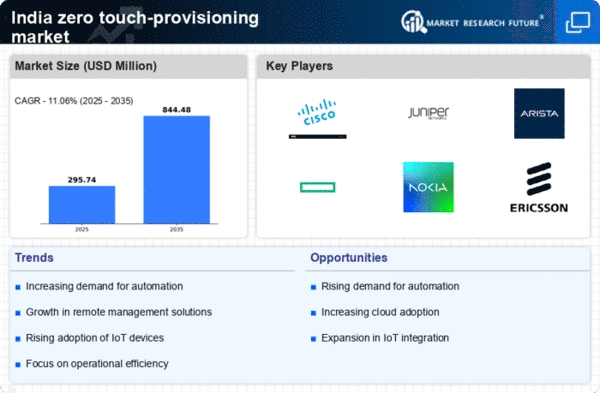Growing Cybersecurity Concerns
In an era where cybersecurity threats are escalating, the zero touch-provisioning market in India is gaining traction as a solution to enhance network security. Organizations are increasingly aware of the vulnerabilities associated with manual provisioning processes, which can expose networks to potential breaches. Zero touch-provisioning solutions offer automated security protocols that can be implemented consistently across devices, thereby reducing the risk of human error. The market is projected to grow by 20% annually as businesses prioritize security in their digital transformation strategies. This trend underscores the importance of integrating robust security measures within the zero touch-provisioning market, as organizations seek to protect sensitive data and maintain customer trust.
Advancements in Cloud Technologies
The rapid advancements in cloud technologies are significantly influencing the zero touch-provisioning market in India. As more organizations migrate to cloud-based infrastructures, the need for efficient provisioning solutions becomes increasingly critical. Cloud environments require dynamic and scalable provisioning processes that can adapt to fluctuating demands. Zero touch-provisioning solutions facilitate this adaptability by automating the deployment of resources in real-time. The market is expected to witness a growth rate of 22% over the next five years, driven by the increasing adoption of cloud services across various sectors. This trend highlights the necessity for the zero touch-provisioning market to evolve in tandem with technological advancements, ensuring that businesses can leverage the full potential of cloud computing.
Increased Focus on Customer Experience
Enhancing customer experience is becoming a pivotal driver for the zero touch-provisioning market in India. As competition intensifies across industries, organizations are striving to deliver superior service quality. Zero touch-provisioning solutions enable faster deployment and configuration of network services, which directly impacts customer satisfaction. By automating these processes, businesses can respond more swiftly to customer needs and reduce service downtime. A recent survey indicates that companies implementing zero touch-provisioning have seen a 40% improvement in customer satisfaction ratings. This focus on customer experience is likely to propel the growth of the zero touch-provisioning market, as organizations recognize the value of efficient service delivery in retaining and attracting customers.
Rising Demand for Seamless Connectivity
The zero touch-provisioning market in India is experiencing a surge in demand for seamless connectivity solutions. As businesses increasingly rely on digital infrastructure, the need for efficient network management becomes paramount. This demand is driven by the growing number of Internet of Things (IoT) devices, which are projected to reach 1.5 billion by 2025 in India. Consequently, organizations are seeking zero touch-provisioning solutions to automate device configuration and management, thereby reducing operational costs and enhancing user experience. The market is expected to grow at a CAGR of 25% from 2025 to 2030, indicating a robust trajectory for the zero touch-provisioning market. This trend reflects a broader shift towards digital transformation across various sectors, including telecommunications, healthcare, and manufacturing.
Cost Efficiency and Resource Optimization
Cost efficiency is a critical driver for the zero touch-provisioning market in India. Organizations are increasingly recognizing the financial benefits of automating network provisioning processes. By minimizing manual intervention, companies can significantly reduce labor costs and the potential for human error. A recent study indicates that businesses adopting zero touch-provisioning solutions can save up to 30% on operational expenses. This cost-effectiveness is particularly appealing to small and medium enterprises (SMEs) that are looking to optimize their resources while maintaining competitive service levels. As the zero touch-provisioning market continues to evolve, the emphasis on cost savings will likely drive further adoption, enabling organizations to allocate resources more effectively and invest in innovation.
















